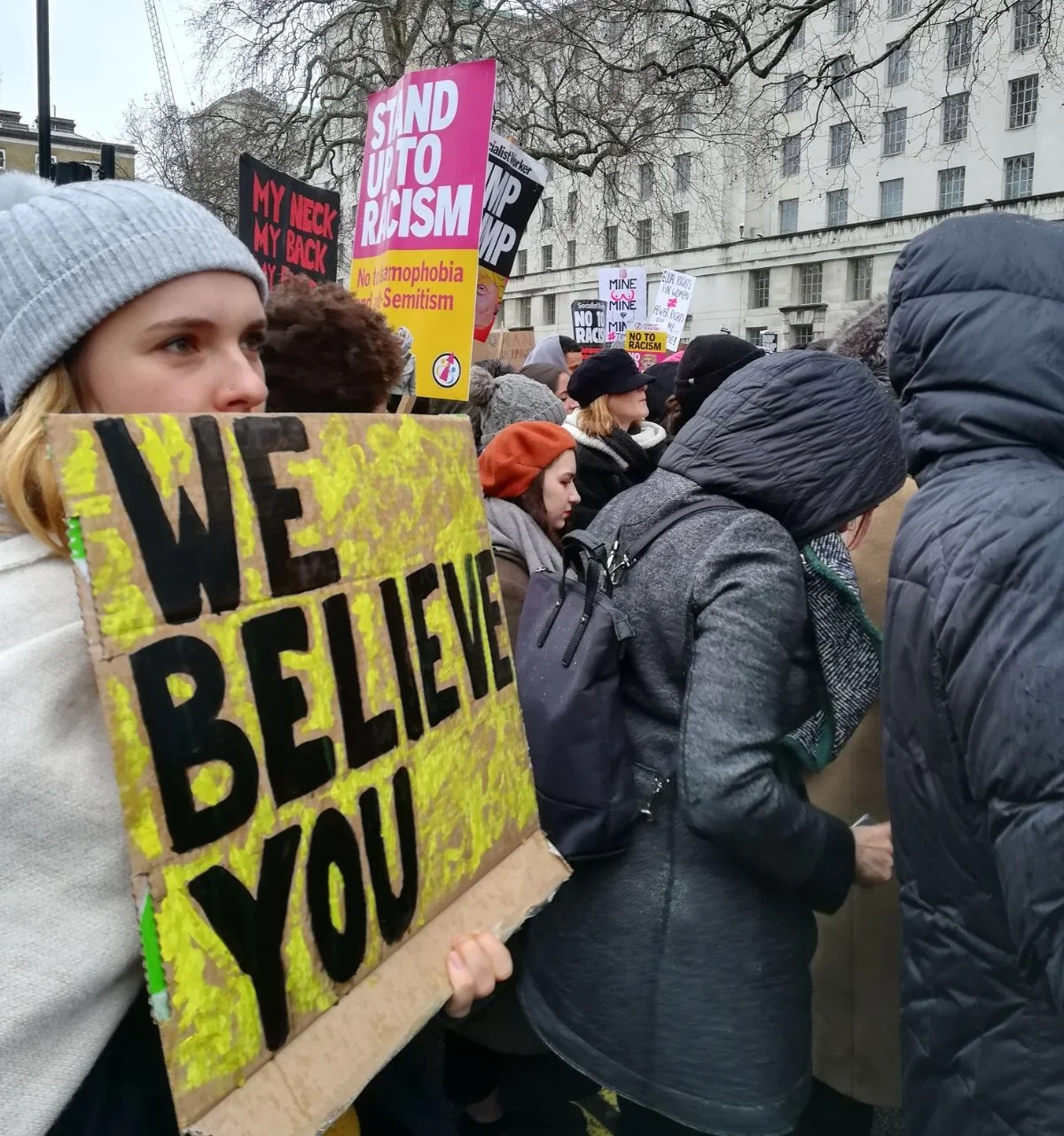London Women's March 2018
by Rose Collard
A year to the date since the Women’s March of 21st January 2017 (the first day of Donald Trump’s presidency), the Time’s Up Rally was held to commemorate this anniversary. As a Leeds-based magazine, Harpy was unable to attend the London rally, but we caught up with our friend Kirsten Peters Roebuck (@KirstenP_R), who was there in full force.
Harpy: Can you describe the set-up of the event?
Kirsten: Well the most stand out thing was that it was snowing and freezing cold. The fact that so many had turned out in such grim weather was really something. No roads were shut unlike last year’s march, so we were all gathered in Richmond Terrace, right next to the memorial of the women of World War II, which felt really moving and powerful.
H: What were the speakers like?
K: The speakers were brilliant. The organisers did an amazing job of lining up a really passionate, eloquent, diverse panel. Paris Lees I’d say was my favourite. She said she was scared she was going to get egged which was heart-breaking to hear, but she was just phenomenal. She spoke eloquently and movingly about trans rights, her own experiences and the challenges of visibility. It also prompted a discussion amongst my friends about pussy hats, something that has come under scrutiny of late.[1] Dr. Shola Mos-Shogbamimu, founder of the Women in Leadership publication[2] and co-organiser of the rally, was also amazing at getting the crowd going; she got us all dancing and chanting and really kept the energy up. Stella Creasy was another great speaker, as well as Rennie Eddo-Lodge (author of Why I’m No Longer Talking to White People About Race) and Phyll Opoku-Gyimah of UK Black Pride. There was a lot of addressing of Theresa May who may or may not have been in at Downing Street just across the road, which felt powerful and also a bit surreal. There was also the brilliant Holler4 choir, performing “I can’t keep quiet”, which has become a bit of a soundtrack to this movement since the 2017 Women's March.[3]
H: How did it compare to last year’s event?
K: It was quite a different atmosphere to last year. The Women's March felt a lot like being part of this big, powerful, canonical moment in history, that women coming together shut down streets all over the city. It felt like it happened so quickly that the mood was celebratory and we were all a bit surprised and in awe at what we'd achieved. This year was a rally rather than a march, so it was smaller and more contained. The focus was Time's Up, in all its many forms – in the wake of #MeToo but also in terms of racism, sexism, homophobia, transphobia and more. It was collective anger and solidarity and wanting to be heard that propelled it forwards. That's what keeps people out in the snow on a Sunday morning.
H: Can you describe some of the other people you saw there – were there any memorable costumes or slogans?
K: There were some women dressed as suffragettes which was brilliant. Also families with young children which was really amazing, especially considering the weather. I think that really shows how important this is to a lot of people. There were also a lot of dogs, which are always great for morale.
Suffragette costumes at the Women's March 2018.
H: How would you say it did in terms of intersectionality?
K: With the speakers, it was great, they really nailed it. The crowd was diverse to an extent, but perhaps not to a degree that's representative of London and there's been some interesting discussion on Twitter since then as to why that was.
H: What would you say were your main take homes from the march?
K: There was such a strong sense of sisterhood and belonging, it was really overwhelming. Also carrying signs meant you interacted with others, which was a great icebreaker. I think for me as well that knowledge that you just have no idea how all these issues might have affected someone. That knowledge - or I guess lack of – is why we have to keep fighting. I think marches and rallies like this are only ever positive things. Despairing alone is horrible, but there truly is power in numbers and I think we can do something – look at the allegations that have come out now about Larry Nassar from the young women of the USA gymnastics team![4] This whole thing really feels like it’s gaining momentum, and I think what’s working about this movement is that it really does address every woman, young or old, cis, trans or genderqueer. We’ve got to keep channelling this collective energy because it will always transfer into something else.
Kirsten is a theatre producer living in London. She is also Co-Producer of politically/socially engaged theatre company COMPLEX. They host regular political arts night Taking Back Control [TBC] and are currently developing a new national community tour of a fierce feminist show + workshop for women* (cis and trans women + genderqueer people all very welcome). More details to be announced soon on their Twitter @theCOMPLEXco.
Take part in 10 Actions, a new initiative by Women’s March on London, where every 10 days, over the next 100, they will take action on an issue we all care about. Follow the initiative here.
[1] https://www.washingtontimes.com/news/2018/jan/11/womens-march-ditching-pussyhats-because-they-exclu/
[2] https://www.wilpublication.com/
[4] http://www.independent.co.uk/news/world/americas/larry-nasser-abuse-sentence-victims-latest-court-judge-michigan-judge-janice-cunningham-a8187926.html






